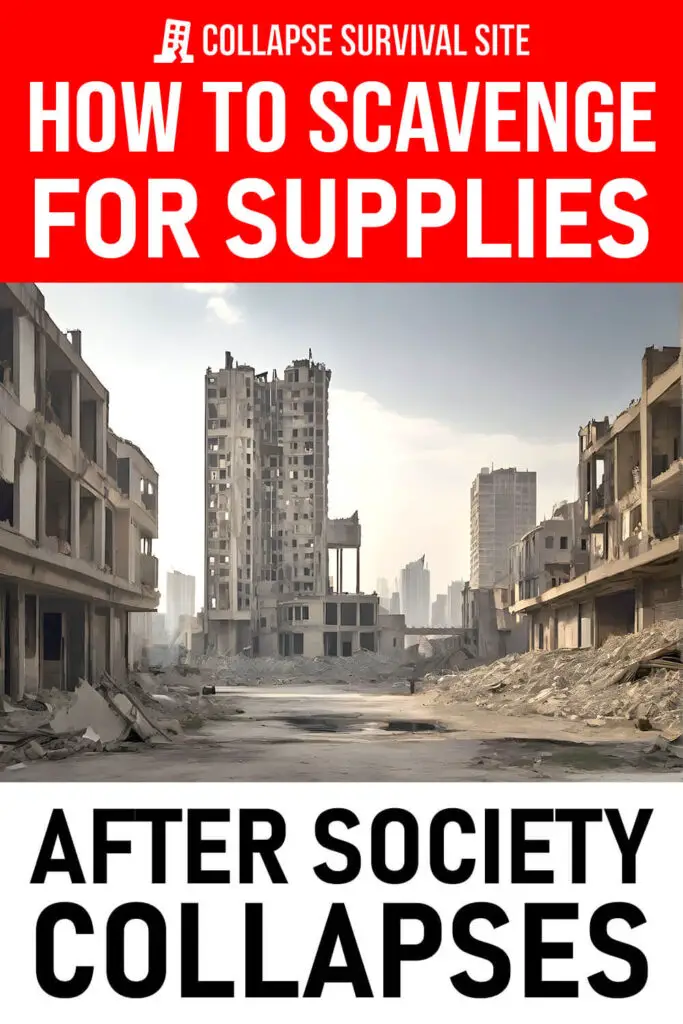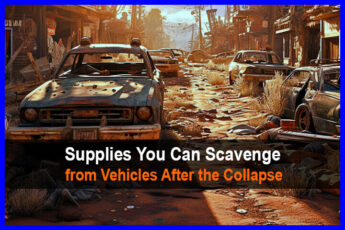Estimated reading time: 16 minutes
Every year, it becomes more and more obvious that society is going to collapse in the coming decades. And every year, more and more scientists warn that we're running out of time. So if you haven't started stockpiling food and emergency supplies, it's time to get started.
But what happens when you run out of supplies? Societal collapse isn't a temporary disaster where everything goes back to normal after a few weeks. It's forever, which means you would need enough supplies to last the rest of your life. Obviously, that isn't realistic.
The hope is that local communities will work together to grow food and produce the things people need to live. But whether that happens or not, it will be necessary to scavenge for supplies in abandoned homes and buildings, which is more dangerous than you might think.
Before you head out into a post-apocalyptic wasteland, you need to take several precautions. In this post, we'll explain exactly how to scavenge for supplies after society collapses.
Want to save this post for later? Click Here to Pin It On Pinterest!
The Ethics of Scavenging for Supplies
As any prepper knows, it's important to be prepared for a crisis. But what happens when the supplies you've stockpiled run out? Should you scavenge for supplies, or is that unethical?
There are a few things to consider before making the decision to scavenge.
First, are you scavenging from abandoned homes or businesses? If so, then it's unlikely that anyone will miss the supplies you take. However, if you're scavenging from homes that are still occupied, then you could be taking away essential supplies from people who need them.
Second, consider the severity of the crisis. If it's a short-term emergency, then scavenging may not be necessary. But if it's a long-term disaster, then scavenging could be the only way to obtain essential supplies.
Finally, think about your own personal ethical code. Some people believe that anything is fair game in a crisis, while others believe that scavenging should be reserved for desperate situations.
Ultimately, the decision whether or not to scavenge for supplies in a crisis is a personal one.
Scavenging vs. Looting
In a crisis situation, there is often a fine line between scavenging and looting. Scavenging generally refers to the act of collecting abandoned or discarded items that can be used, while looting typically refers to the act of stealing goods forcefully. In some cases, looting may also involve destruction or damage to property.
One key difference between the two is that scavenging is usually done out of necessity, while looting is often motivated by greed. In a crisis situation, people may scavenge for food, water, or other supplies that they need in order to survive. On the other hand, looters may target businesses or homes in order to take advantage of the chaos and steal valuable items.
Another key difference is that scavenging is typically done in an orderly fashion, while looting is often done in a disorderly and destructive manner. When people are scavenging, they are typically looking for specific items that they need and are not interested in causing damage.
Looters, on the other hand, may smash windows or break into homes in order to grab whatever they can get their hands on.
So, while there are some similarities between scavenging and looting, there are also some important differences. In general, scavenging is done out of necessity while looters are driven by greed or violence.
Scavengers typically cause little or no damage, while looters may destroy property in their quest for goods.
What to Scavenge For
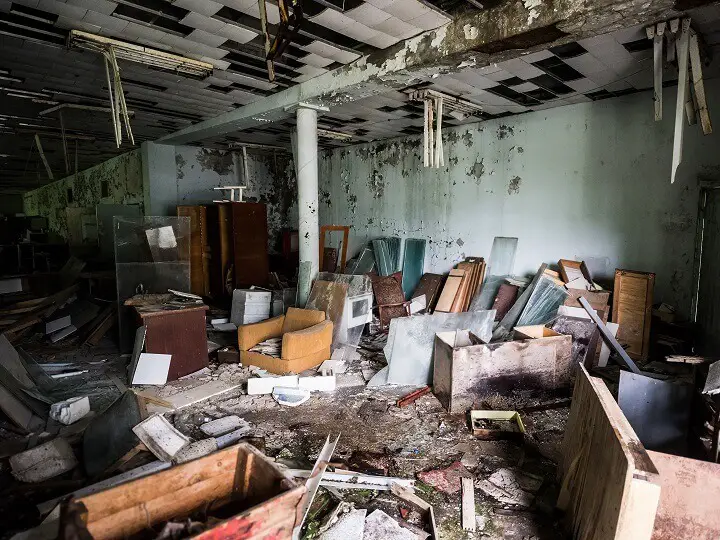
When an emergency strikes, it can be hard to know what to do. One of the most important things you can do is to be prepared. This means having a plan and gathering supplies ahead of time.
But if you have to scavenge for supplies, what sort of survival items should you look for? Here are some suggestions.
Food
One of the most vital things to have on hand in a crisis is food. If you have a stock of non-perishable food, you'll be able to stay fed even if stores are closed.
For example:
- Fruit and vegetables: These will likely be the first to go, so try to find them before they spoil.
- Canned goods: These will last much longer than fresh produce, so they're a good option if you can find them.
- Meat: Keep in mind that raw meat can be dangerous, so only eat it if you're sure it's safe.
- Grains: Grains such as rice and wheat can last for a long time if they're stored properly. Keep an eye out for mice and other pests, as they can ruin a stockpile of grains quickly.
You should also make sure to have plenty of water on hand. It's important to have at least a gallon per person per day. If possible, store water in clean, sealable containers.
Medicine and First Aid Supplies
In terms of medicine, it's a good idea to have a basic first aid kit. This should include bandages, antiseptic wipes, pain relievers, and any other medications you or your family members take on a regular basis.
It's also a good idea to have a supply of medical supplies like gauze and medical tape. If you wear glasses or contact lenses, make sure to have a spare pair on hand.
Supplies
Other essential supplies include flashlights, batteries, and a radio. A generator can also be useful, but make sure to get one that's appropriate for the size of your home.
Some other important items include:
- Ammunition
- Blankets
- Buckets
- Clothing
- Fuel
- Tools
- Outdoor equipment
- Water purification equipment
- Weapons
Lastly, don't forget about cash. In a crisis, ATMs may not be working, so it's important to have some paper money on hand.
Where to Scavenge
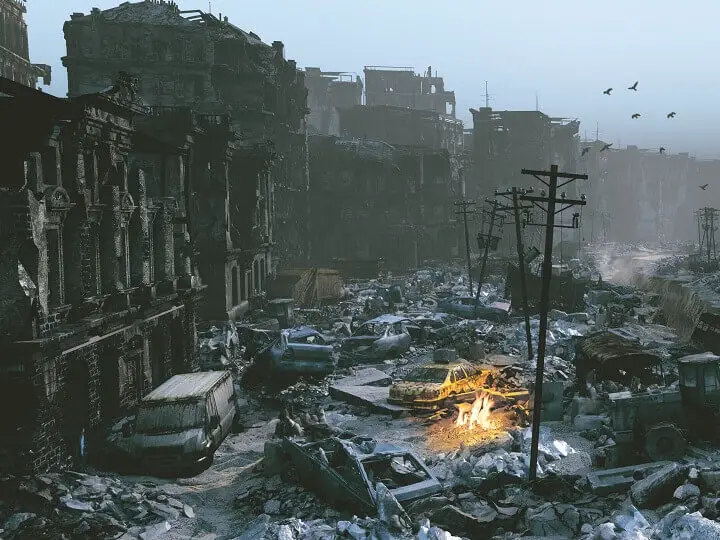
After a societal collapse, the grocery store will be one of the first places to be looted. But it won't be the only place. Drug stores, hardware stores, and electronics stores will also be emptied out very quickly.
So where can you find supplies?
Here’s a more comprehensive list – but keep in mind that all of these places should be abandoned buildings. If you start “scavenging” in occupied homes or businesses, you cross the line into looting – and that’s not okay. Plus, you're liable to get shot.
Stores
In a societal collapse, the most obvious places to scavenge food would be grocery stores. However, if you're looking for other items that could be useful, don't overlook places like hardware stores, pharmacies, and restaurants.
Here are a few ideas of what you might be able to find:
- Gardening stores: Seeds, fertilizer, soil, gardening tools, etc.
- Hardware: Nails, screws, tools, rope, duct tape, etc.
- Pharmacies: Medications, first aid supplies, etc.
- Restaurants: Canned goods, cooking supplies, etc.
- Sporting goods stores: Camping gear, sports equipment, etc.
Of course, this is just a small sampling of what might be available. The key is to think creatively about how different types of stores could be useful in a survival situation. With a little planning and foresight, you can ensure that you'll have the supplies you need.
Warehouses and Factories
With no stores or factories operating, there will be no way to obtain essential goods and services.
However, if you know where to look, there are a number of items that can be scavenged from warehouses and factories. Food, medicine, and clothing are all likely to be stored in these locations, and if you are able to find them, they could save your life.
In addition, many factories contain materials that can be used for shelter or construction, such as metal and wood.
Hotels
In a societal collapse, the things you can scavenge from hotels will be extremely valuable. There will be a lot of people looking for food and water, and hotels will be one of the first places they look. You can scrounge up blankets, towels, linens, toiletries, and more from hotels.
However, the most valuable thing you can find in a hotel is food. The kitchens in hotels are stocked with non-perishable food that can last for months. If you can get to a hotel before the crowds do, you'll be able to stockpile enough food to last you a long time.
But beware, hotels will be dangerous places during a societal collapse. Looters will be everywhere, and you'll need to be careful if you want to make it out alive.
Hospitals
In a societal collapse, hospitals will be one of the first places to be looted. However, there are still many items that can be scavenged from these buildings.
Medical supplies such as bandages and antibiotics will be in high demand, so it is worth scouring the hospital for these items.
Additionally, hospitals often have generators and other forms of backup power, which can be useful in a collapse scenario.
Airports
In a societal collapse, airports would be one of the first places to be looted and scavenged. There would be a lot of valuable items to be had, including food, water, medical supplies, and weapons.
Here are some things that you could potentially find:
- Food: There would likely be a lot of food left behind in an airport, especially in the restaurants and cafes. However, it would probably all be perishable, so you would need to eat it quickly.
- Water: There would also be a lot of water available, both in the bathrooms and in the vending machines. Again, it would all be perishable, so you would need to use it quickly.
- Medical supplies: There would likely be a lot of medical supplies available in an airport, including first aid kits and over-the-counter medications. However, you would need to be careful with these as they could expire quickly.
- Weapons: There would also be a lot of weapons available in an airport, including guns and knives. However, you should only take these if you are sure that you can use them safely and effectively.
Fire Stations
Fire stations are often equipped with generators and other forms of backup power, as well as ladder trucks and other heavy equipment. While it would be difficult to carry all of this equipment with you in an evacuation, it could be possible to salvage some of it for use later.
Cars
Although vehicles will likely be abandoned, they can still provide a wealth of materials that can be scavenged. Among the most useful items are tires, which can be used for transportation or as makeshift shelters. Gasoline can also be extracted from cars, providing a valuable commodity for bartering. In addition, car parts can be used to create tools and weapons.
Dumpsters
One often-overlooked source of supplies is the dumpster. With a little effort, you can find everything from canned goods to clothing to building materials in a dumpster.
Gas Stations
In a societal collapse, gas stations will be one of the first places to be looted. However, there are still plenty of items that can be scavenged from these locations.
The most obvious item is gasoline. Gasoline can be used to power vehicles, generators, and other machines. It can also be traded for other goods and services.
Another valuable item that can be found at gas stations is food. Oftentimes, gas stations will have a small selection of non-perishable foods that can be eaten as-is or used to barter with. In addition, many gas stations have air compressors that can be used to inflate tires or power other devices.
Finally, gas stations often have a wide variety of tools and parts that can be used for repairs or construction.
Government Buildings
Government buildings are often good places to scavenge in a societal collapse. Many government buildings have supplies that could be useful in a survival situation, such as food, water, and medical supplies.
Government buildings also often have things like generators and solar panels, which could be used to power homes or other critical infrastructure. In addition, government buildings usually have plenty of resources that can be used for bartering, such as ammunition and weapons.
Schools
In a societal collapse, schools would be one of the first places people would look to scavenge resources. Not only would you be able to find food and water, but you could also find medical supplies, tools, and clothing.
What Tools To Bring When You Scavenge
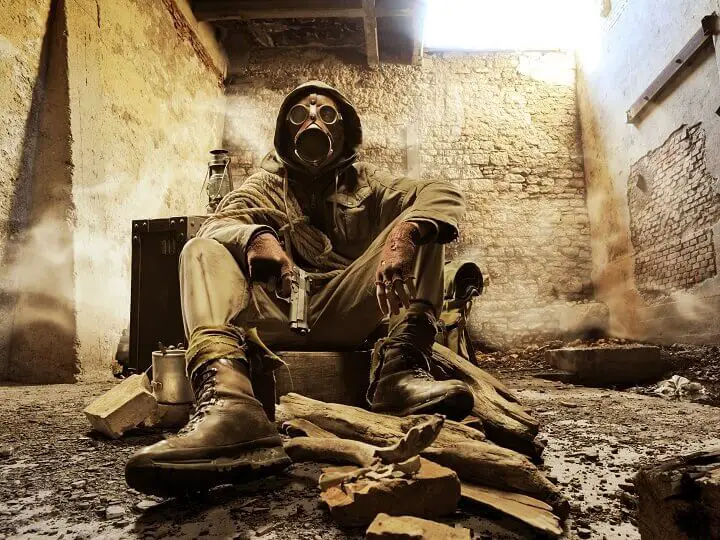
When the SHTF, you're going to have to scavenge for supplies. But what should you bring with you?
Backpack
A backpack or bag is an important tool for carrying all of your other scavenging tools with you as you search for supplies. Choose a backpack or bag that is spacious and has multiple compartments so that you can easily organize all of your items
Bump Keys
Bump keys can be used to open locks, giving you access to locked buildings and rooms.
Canteen
A canteen will help you to stay hydrated while you’re out on the road.
Cordage
Cordage can be used for everything from making shelter to fashioning a weapon.
Flashlight
Make sure you bring a flashlight. It's dark in most places after a collapse, and you don't want to step on something sharp in the dark.
Gas Can and Siphon Pumps
A gas can and siphon pump will come in handy for quickly transferring fuel from one vehicle to another.
Crowbars
You'll need some basic tools to help you pry open doors, smash through walls, and otherwise get to the goodies hiding behind them. Crowbars are always useful for prying open doors and windows.
Protective Gear
When scavenging, it is important to wear protective clothing to guard against cuts, scrapes, and other injuries. Long pants and long sleeves are recommended, as well as gloves and closed-toe shoes. If possible, it is also a good idea to wear a dust mask or respirator to protect your lungs from harmful particles.
Handgun
And if not a handgun, you may want to bring a weapon of some kind, just in case you run into any unsavory characters.
Hacksaw or Hatchet
A hacksaw or hatchet will be essential for breaking down doors and barriers.
Knives
A good knife is perhaps the most important tool you can bring when scavenging. A knife can be used for a multitude of tasks, such as cutting through debris, preparing food, and self-defense. It is important to choose a knife that is durable and easy to sharpen.
A multi-tool is another essential tool to bring when scavenging. A multi-tool is a handheld device that contains a variety of tools, such as pliers, scissors, and a knife. This type of tool can be very useful in a pinch and can save you time and effort in having to find each individual tool.
First Aid Kit
A first aid kit is an absolute must when scavenging, as you never know what type of injuries you may sustain. A first aid kit should contain basic items such as bandages, gauze, antiseptic wipes, and pain medication.
It is also a good idea to include items such as tweezers and safety goggles in your kit in case you come across any hazardous materials.
Lockpicks
You will need a good set of lockpicks. This will allow you to get into any locked buildings or rooms that you come across.
Food and Water Supply
Make sure that you have a food and water supply. This is critical in ensuring that you are able to survive the trip if it takes you longer than expected to get back.
Map
Bring a map of the area. You don't want to get lost in all the chaos.
Bolt Cutters
Finally, you will need a set of bolt cutters. This will allow you to cut through any chains or locks that are preventing you from getting to the supplies that you need.
General Tips for Scavenging
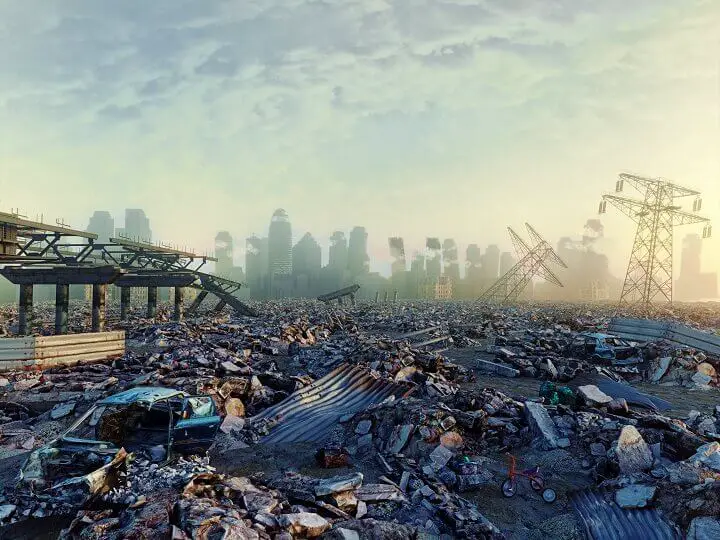
In a situation where society has collapsed, it will be important to scavenge for supplies in order to survive. Here are some tips to help you find what you need.
Assess Your Needs
The first step is to assess your needs. What do you need in order to survive? Make a list of all the essential items you'll need, such as food, water, shelter, and clothing. Once you know what you need, you can start looking for places where those items are likely to be found.
Use a Map or GPS
If you find yourself in the midst of a societal collapse, one of the most important things you can do is to find a map or GPS system. This will help you to navigate your way to safety, and to find the supplies you need to survive.
While it may be tempting to rely on your phone for directions, remember that electronic devices can quickly become useless in an emergency situation. A paper map or a handheld GPS unit is far more likely to be reliable when you need it most.
Make Sure Efforts Are Ongoing
One of the most important things you can do to prepare for a societal collapse is to scavenge for supplies.
However, it's not enough to just stockpile supplies. You also need to make sure that your efforts are ongoing. This means scouring your environment on a regular basis for anything that might be of use. It might seem like a lot of work, but it's better than being caught unprepared when disaster strikes.
Schedule in Advance and Give Yourself Lots of Time
When the apocalypse hits, you're going to need all the supplies you can get your hands on. But if you want to improve your chances of survival, it's important to start scavenging before things get too chaotic. By planning ahead and stockpiling supplies, you'll be better prepared when the time comes to forage for food and water.
Avoid going into unfamiliar territory alone, and always be on the lookout for potential hazards. It's also wise to bring along a friend or family member who can help you carry supplies back to your shelter.
Safety Tips for Scavenging
According to experts, society as we know it could collapse within the next few decades. This could be due to a number of factors, including economic instability, resource depletion, and environmental disaster.
While the government may provide some support during this time, it is likely that individuals will need to fend for themselves. One way to do this is by scavenging for supplies.
However, there are a few safety considerations to keep in mind:
- It is important to send out a scout to assess the situation before entering an area.
- Work in groups whenever possible.
- Bring weapons to defend yourself from both wild animals and other people.
- Have a communication plan in place so you can stay in touch with your group and appoint a lookout to keep watch while others are scavenging.
- Always have a plan and a back-up plan in case things go wrong.
By following these safety tips, you can increase your chances of survival during a societal collapse.
Final Thoughts
A societal collapse would be a chaotic and dangerous time. If you're not prepared, it will be hard to find the supplies you need. But if you know where to look and what to look for, you can scavenge enough supplies to help you get by.
Like this post? Don't Forget to Pin It On Pinterest!

